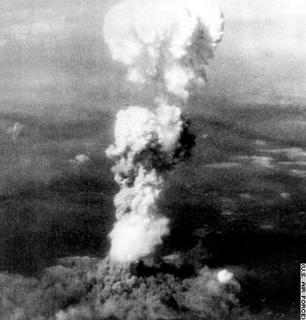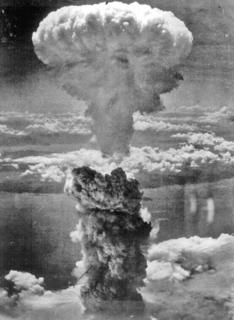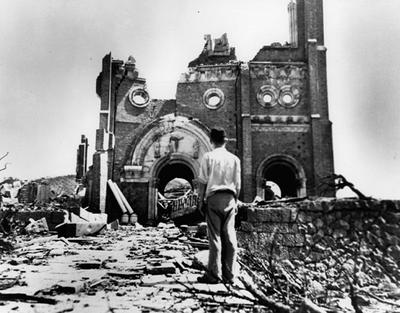 I’m not a Christian, but I am a fan of the life, work, example, and thrilling story of Yeshua of Nazareth (aka “Jesus”). The great Roman historian Tacitus mentions Jesus in his description of the scandal and chaos that followed the terrible Fire of Rome (of “Nero fiddled while Rome burned” fame):
I’m not a Christian, but I am a fan of the life, work, example, and thrilling story of Yeshua of Nazareth (aka “Jesus”). The great Roman historian Tacitus mentions Jesus in his description of the scandal and chaos that followed the terrible Fire of Rome (of “Nero fiddled while Rome burned” fame):
“…the blaze came to be believed to be an official act. So, in order to quash the rumour, (Emperor) Nero blamed it on, and applied the cruellest punishments to, those sinners, whom ordinary people call Christians, hating them for their shameful behaviour. The originator of this name, Christus, was sent to execution by Procurator Pontius Pilate, during the reign of Tiberius, but although checked for a moment, the deadly cult erupted again, not just in Judaea, the source of its evil, but even in Rome, where all the sins and scandals of the world gather and are glorified. (“The Annals” xv.44.2–3)
Today is the 60th anniversary of VJ (Victory over Japan) Day, the end of WWII. Following the dropping of a uranium fission bomb named “Little Boy” into the city of Hiroshima on August 6, 1945 – which killed approximately 140,000 people – then the detonation of a plutonium fission bomb named “Fat Man” over the city of Nagasaki on August 9, 1945 – which killed approximately 70,000 people – the Japanese surrendered, and the war ended.
FUN FACT: If you could regenerate the bodies of all the people killed in the nuclear bombings of Hiroshima and Nagasaki and lay them end to end, the line of corpses would stretch 200 miles, and their combined weight would near 6000 tons!
“Hiroshima” is a household word. Whenever we look forward to the use of nuclear weapons in the future, we use the name of the Japanese city as short-hand for “13,000 tons of TNT”. We say: “If this XYZ device exploded in the middle of a pre-school in New York City, it would do so with the strength of 10,000 Hiroshimas!” We tend to say it gleefully, as if we were happy that our nuclear weapons have so admirably outdone the quaint Little Boys of our forefathers.
FUN FACT: Today, Hiroshima is the home of the Hiroshima Toyo Carp baseball team, six-time champions of Japan’s central league and winner of 3 of the Japan Series.
 Most citizens of the Allied nations are less familiar with the city of Nagasaki. Nagasaki, capital of Nagasaki Prefecture on the island of Kyushu, was the center of European influence in medieval Japan and so was one of the first Japanese cities to be Christianized. In fact, it was Europeans – Portuguese traders who ran aground near the town – who literally put the insignificant little village on the map. In 1945 Nagasaki had the largest Christian population in Japan and was home to Urakami Cathedral, which had been the largest Cathedral in eastern Asia. Nagasaki’s Christian population blossomed still further after World War II.
Most citizens of the Allied nations are less familiar with the city of Nagasaki. Nagasaki, capital of Nagasaki Prefecture on the island of Kyushu, was the center of European influence in medieval Japan and so was one of the first Japanese cities to be Christianized. In fact, it was Europeans – Portuguese traders who ran aground near the town – who literally put the insignificant little village on the map. In 1945 Nagasaki had the largest Christian population in Japan and was home to Urakami Cathedral, which had been the largest Cathedral in eastern Asia. Nagasaki’s Christian population blossomed still further after World War II.
FUN FACT: The names of both “Hiroshima” and “Nagasaki” have appeared in the titles of French films!
If I’m not mistaken, scientists have proven that the atomic bombing of Hiroshima and Nagasaki saved many thousands of lives.
Following are some of my favorite lines of dialog from the story of Yeshua of Nazareth (aka Jesus). These are from his biographies. We don’t really know for certain whether the biographies were “authorized biographies” or not, or if they were just fan fiction. But I am a trained writer of movie scripts and have a pretty good ear for language, and it’s interesting to sometimes read lines that sound more like real human speech and less like movie dialog. I tend to like those realistic sounding lines the best. Some of Jesus’s greatest hits are in a collection called “The Sermon On The Mount”, which reads a bit like a college student’s lecture notes, as if one of the Disciples was sitting there scribbling as fast as he could: “Dude. Wait. Can you say that last thing one more time? ‘Ed Meese shall inherit the earth’?? Oh, ‘the MEEK’. Gotcha. Okay. Go on…”
Happy VJ Day!

1. “…Blessed are the merciful: for they shall obtain mercy.
Blessed are the pure in heart: for they shall see God.
Blessed are the peacemakers: for they shall be called the children of God…”
2. “Therefore all things whatsoever ye would that men should do to you, do ye even so to them: for this is the law and the prophets.”3. Then came Peter to him, and said, “Lord, how oft shall my brother sin against me, and I forgive him? till seven times?” Jesus saith unto him, “I say not unto thee, Until seven times: but, Until seventy times seven.”
4. “Take heed that no man deceive you. For many shall come in my name, saying, I am Christ; and shall deceive many. And ye shall hear of wars and rumours of wars: see that ye be not troubled: for all these things must come to pass, but the end is not yet.”
5. Jesus said unto him, “If thou wilt be perfect, go and sell that thou hast, and give to the poor, and thou shalt have treasure in heaven: and come and follow me.” But when the young man heard that saying, he went away sorrowful: for he had great possessions.
6. “Ye have heard that it hath been said, Thou shalt love thy neighbour, and hate thine enemy. But I say unto you, Love your enemies, bless them that curse you, do good to them that hate you, and pray for them which despitefully use you, and persecute you.”7. “For if ye forgive men their trespasses, your heavenly Father will also forgive you: But if ye forgive not men their trespasses, neither will your Father forgive your trespasses.”
8. “O faithless and perverse generation, how long shall I be with you? how long shall I suffer you?”
9. “And why beholdest thou the mote that is in thy brother’s eye, but considerest not the beam that is in thine own eye? Or how wilt thou say to thy brother, Let me pull out the mote out of thine eye; and, behold, a beam is in thine own eye? Thou hypocrite, first cast out the beam out of thine own eye; and then shalt thou see clearly to cast out the mote out of thy brother’s eye.”
10. “For the Son of man is not come to destroy men’s lives, but to save them.”

